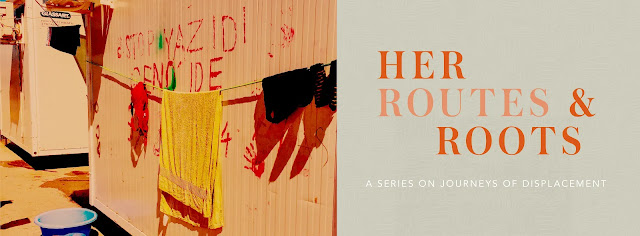"They told us, 'Leave, go away, anywhere you want'." YP's Story
“No one goes anywhere alone, least of all into exile — not even those who arrive physically alone, unaccompanied by family, spouse, children, parents, or siblings. No one leaves his or her world without having been transfixed by its roots, or with a vacuum for a soul. We carry with us the memory of many fabrics, a self soaked in our history, our culture; a memory, sometimes scattered, sometimes sharp and clear, of the streets of our childhood, of our adolescence; the reminiscence of something distant that suddenly stands out before us, in us, a shy gesture, an open hand, a smile lost in a time of misunderstanding, a sentence, a simple sentence possibly now forgotten by the one who had said it.” (Paulo Freire, Pedagogy of Hope)
Her Routes and Roots is a series on journeys of displacement undergone and told by young women, focusing on their resilience and pivotal moments of strength. Stories are drawn from in-depth narrative interviews conducted during Her{connect}Her, a global voice program by Footage Foundation.

(YP is from Syria and currently in Greece. Her story has been edited for length and clarity. Content warning: physical violence).
YP: When the bombing started, and we saw people dying in front of us, just then, we recognized what war is and what it means.
With this realisation, YP lost her safety, she lost her education.Then, one day, she lost her home.
Daesh (ISIS) came to my village, and we lost everything. They made us leave our houses. I was 14, and they [tried to] force me to get married. They asked all the men to fight with them, but my father and all of us refused.
YP's father arranged with a smuggler to help her and the rest of her family get away from there, he had to pay, but eventually, they made it to Damascus.
When we arrived in Damascus… everything was dangerous there for us — to go to school or to go to work. We could not handle the economic situation, because everything was expensive, and we did not have that much money. Everybody inside the house had to work to live. So, a friend of my father from Dubai sent us money so we could leave.
Setting off with her Uncle, and after spending much money to get there, YP and her family made it too Aleppo, from where she tried to get to Turkey. After five tries, they finally arrived and stayed for seven days before crossing to Chios, Greece, where organisors were putting people into camps.
They told us, “Leave, go away, anywhere you want. We cannot put you anywhere. You are in charge of yourselves.”
For YP and her family, the cost of a room in a hotel was too much. So, they and one other family stayed outside. They went to the police and after showing them the fragments in her father’s arm because of the bombing, someone from the camp came and put them inside, sharing with another family.
We traveled all these dangerous roads, because we have a slight hope of a normal life. But, unfortunately we do not get this life. Why can’t we live this life? -YP in her digital story
We were 12 people in one room. We stayed there for three months. Then, we went to Larissa, and it was like the desert there. There was nothing to buy; there were no stores.
Along the way, someone told them about Skaramagas camp. In the pictures they saw that it was better than Chios or Larissa. But, in order to enter they had to leave and apply for their papers.
In Larissa, many Greek people refused refugees.
Finally, they arrived in Skaramagas.
When you arrive, you see that you cannot understand anyone and they cannot understand you. Then, I started school and they taught me how to speak a little English in the beginning, and from [an organization], I learned most of my English.
[In Syria], they stopped school. Every 10 days, we went once, so we stopped completely. [It has been] five years, plus one year here, so six years with no school.Other girls my age are in school now. I am not. They are on their way to do what they want, to go to college, to study what they want. But, I am not in a place to decide what I want to do. This idea is very difficult for me.
If I have my permanent papers, I can go to school in Greece. The schools here are not prepared to take you if you do not know the language already. They did not teach me grammar, the basics. They told me to learn the basics, and I can go back.
Watch the digital story YP created while participating in Her{connect}Her here.
To support some of the thousands of women and girls in situations like YP around the world, and Footage's work; raising voices to elevate lives, please visit: www.footageproject.org/invest.





Comments
Post a Comment